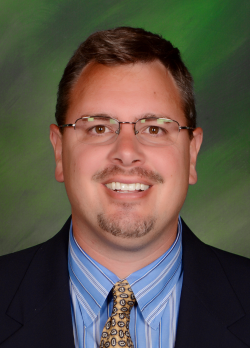|
Bio and Awards
Publications
Teaching
Advising
Service
Textbooks
Calendar
CV
As an advisor, I find that I am most successful working with driven, talented people.
(Fortunately, our group is composed of such people!)
I am not a good micromanager, so be warned that doing research with me works best if you are "all in,"
and likely will not work if you are depending on me to regularly look over your shoulder and/or
motivate you.
(My motivational style is mostly helping students see positive outcomes they could achieve and the steps necessary to achieve them.)
Advising Graduate Student Research
- A typical Ph.D. student in our group will publish approximately five first-authored papers.
My involvement in their research projects varies based on their progress within the program.
For a student's first project,
I am typically very actively involved in selecting the topic, planning experiments, analyzing results,
writing text in their paper, and sometimes even writing code.
I then often play smaller and smaller roles on each successive project,
since the student has increasingly more experience performing research.
- The students in our group frequently participate in internships. I am supportive of this because
it has so many positive benefits:
(1) creating recognition for the student, which often turns into employment opportunities,
(2) helping students identify research problems that will readily translate to real-world impact, and
(3) getting exposure to professional environments so they can make informed decisions about employers
when they graduate.
- If you are a potential Ph.D. student who wants to do research with me, please let me know the following
things:
(1) why you want to get a Ph.D.,
(2) your background in relation to CDUX research directions,
(3) general information about yourself, including your previous degrees, test scores, etc., and
(4) that you read this page.
Advising Undergraduate Student Research
- I advise both theses and general undergrad research.
- Our group's opportunities for undergrad researchers are typically
for students who have sufficient background in visualization, graphics, or high-performance computing.
- In almost all cases, the students I work with have previously taken one or more of my courses, which
helps everyone makes sure there is a strong match.
(If you are an undergrad interested in doing research with me, the best path is to take a class I am teaching.)
Career Advice
If you have previously taken one of my courses and would like career advice, then I am always willing to meet.
To set up an appointment, consult my calendar and
email me a proposed time.
Advising Lineage (My Mentors)
I have been very lucky in having great mentors throughout my career.
Each of them shared the philosophy of putting their employees/students first,
which is a philosophy I now try to employ myself.
I feel indebted to:
- Eric Brugger, my manager at Lawrence Livermore, 1999-2009. When I started at LLNL, Eric had a group composed
mostly of twenty-somethings at their first real jobs, and he molded us all into successful professionals.
During our decade together, Eric invested so much time in me, including
patiently answering every question I had and listening to all my ideas.
- Nelson Max, my Ph.D. advisor, 2000-2006.
Despite being a highly decorated computer graphics researcher,
Nelson let me set the agenda for my dissertation to overlap with my own professional interests,
and he dutifully, promptly, and thoroughly reviewed all of my (poor) writing.
- Wes Bethel, my manager at Lawrence Berkeley, 2009-2016.
Wes taught me to write proposals, gave me feedback I needed, and, watching him, I learned how
to mentor young researchers. Moreover, under his tutelage, I broadened myself as a researcher.
Being in the Lawrence Berkeley environment and working with/for Wes
was a critical step in my move to academia.
- Ken Joy, my manager at UC Davis when I came back to be a professional researcher, 2009-2013.
Ken has advised many students over the course of his career, including more than 25 Ph.D. students.
The impact he made on so many lives (through both advising and teaching)
is an inspiration to me, and one of the primary reasons I chose to join academia.
Further, since my own Ph.D. process was as a remote student, sitting with Ken's group for four years (and seeking his
advice regularly) was critical experience for me in preparing to becoming a professor myself.
According to the Mathematics Genealogy Project,
my advisor-advisee lineage, through
Nelson, traces back to Jacobi and Copernicus, among others. Our group's Ph.D. students share this lineage
when they graduate.
|

